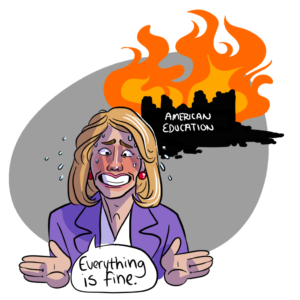The staff editorial is the majority opinion of The Murray State News Editorial Board.

Secretary of Education Betsy DeVos has headed the United States Department of Education for a year now. Compared to other leaders of the current administration, DeVos has kept a surprisingly low profile.
Now is a good time to reflect on her impact, or lack thereof, on the uncertain future of our education system.
DeVos’ position on Title IX protections has raised many eyebrows. Title IX, a law passed in 1972, prohibits sex discrimination in schools. Former President Barack Obama interpreted the law as meaning students should be protected from sexual harassment and assault as well. Women’s rights activists and other groups heralded this as a huge step towards creating positive and safe learning spaces for all students.
However, DeVos has been outspoken about the former administration’s take on Title IX. She felt the rights of the accused were being thrown by the wayside, and due process was being ignored.
In a press release from September 2017 concerning her changes to Title IX investigations, DeVos said “this interim guidance will help schools as they work to combat sexual misconduct and will treat all students fairly.” To critics of the Obama-era regulations, this was a step towards protecting the rights of all involved parties. Opponents of DeVos criticized this move, citing a long history of unreported and unresolved sexual assaults which were only beginning to be taken seriously in the past decade.
The school choice movement is another important tenet of DeVos’ crusade to better our schools. In short, school choice refers to broadened freedom for students to pursue primary education outside of the public school system, a system which DeVos has criticized on many occasions. This initiative aims to increase public funding for charter schools and online institutions.
Public schools are required to meet certain benchmarks or show intent to meet said benchmarks in order to not be penalized or investigated. This is one of the checks put into place to make sure taxpayer money is being used as efficiently as possible. Charter schools are under no such obligation. They siphon money from public schools without incurring any of the responsibility.
The effectiveness of charter and online schools has been widely debated. According to a report by The National Center for Education Evaluation and Regional Assistance, the “impact on student achievement varied significantly across schools.”
Urban charter schools appeared to fare better than their rural counterparts on average according to the study, though the data we have does little to prove that creating alternative publicly-funded institutions will help solve the current issues permeating our education system.
Perhaps the most controversial of DeVos’ changes has been to the student loan forgiveness program which was created to provide relief to defrauded students. For-profit colleges often used predatory practices to draw in students, regularly leaving the victims with large loans they could not repay.
Under the Obama-era regulation, if one could prove they were wronged by a secondary education institution, their loans were entirely forgiven. DeVos set in place a sliding relief scale, one which offers full forgiveness to students who earn less than 50 percent compared to their peers. However, the more your earnings, the less likely you are to receive substantial loan forgiveness.
Critics of DeVos have often noted her ties to for-profit colleges and loan companies. Rescinding protections for students victimized by said institutions does little to instill faith in the Secretary of Education.
So how effective was Betsy DeVos in her first year as the head of the Department of Education? We’d say somewhere in the middle. DeVos is certainly unafraid to rock the boat, even if she herself falls overboard. Avoiding many of the controversies plaguing her colleagues is commendable, but she has accomplished little in terms of bettering our education system.




























































































